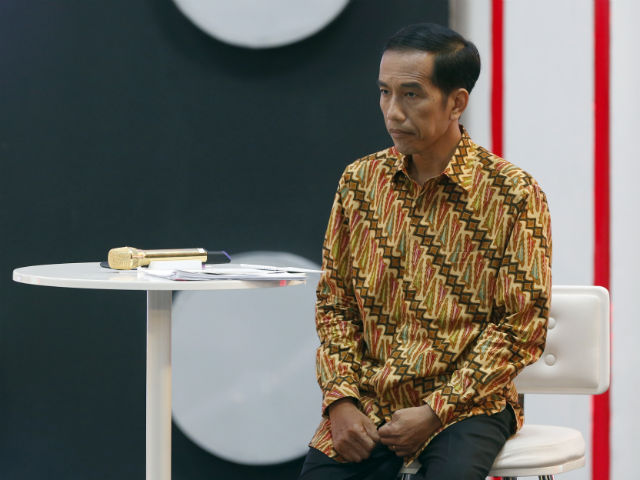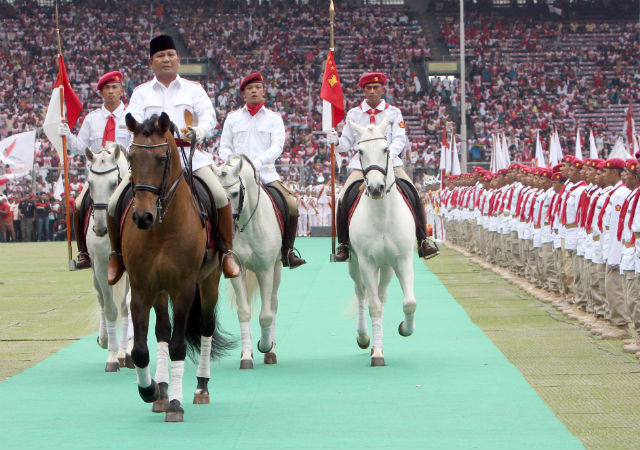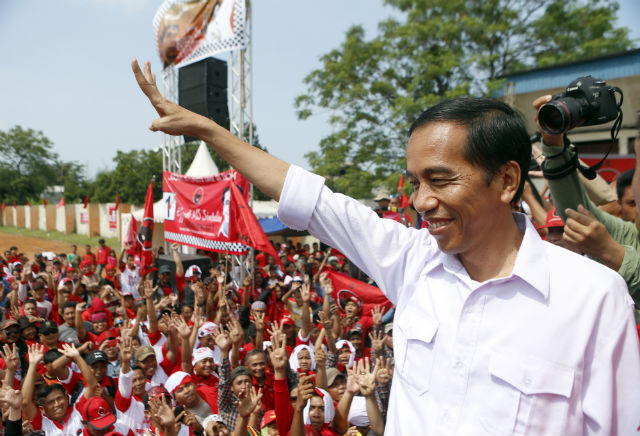SUMMARY
This is AI generated summarization, which may have errors. For context, always refer to the full article.

JAKARTA, Indonesia – The morning after Indonesia’s third presidential debate, a number of news reports and analyses seem to show that Jakarta Governor Joko “Jokowi” Widodo once again trumped retired Gen. Prabowo Subianto.
The Jakarta Post’s banner on Monday, June 23, read “Jokowi wins on Prabowo’s turf”, referring to the two-hour debate on Sunday night, June 22, on international affairs and defense issues, which are seen to be strong suits for the former general.
Yose Rizal of Politicawave, a social media monitoring outfit, also said netizens overwhelmingly showed support for Jokowi. They monitored 140,503 conversations about Jokowi compared to 46,769 for Prabowo, with net sentiment favoring the governor at 112,420 over the latter’s 22,633.
The debate began with the 2 candidates introducing what their foreign affairs and defense policies would be. While Prabowo’s policies appeared to be centered on strengthening Indonesia internally in order to be respected abroad, Jokowi outlined key priorities like support for Palestine, maritime orientation, protection of migrant workers, and modernization of weaponry.

“It will be impossible for us to become an independent nation, it will be impossible for us to become a respected nation, if our people are poor. This is the foundation of my international politics… Our economy must be strong. Our national wealth must be secure,” Prabowo thundered at the start of the debate, enunciating each syllable for maximum effect, like a stern lecturer.
A much less forceful orator, Jokowi – this time wearing a Batik shirt after his unusual choice to wear a suit in earlier debates attracted much commentary –followed him with a recitation of his key priorities, punctuated by glances at his index cards. “We want to achieve strong national security. How will that be achieved? First, through the prosperity and welfare of soldiers. Second, through the modernization of defense equipment… [pauses to look at notes] And the third one is modernizing the defense industry.”
Many of the Twitter reactions during the Sunday night debate commented on how Jokowi provided more substantial answers – though less eloquently – than Prabowo, who stuck to his chest-thumping rhetoric.
I was promised an interesting debate where Prabowo'd shine, what with this being his strongest expertise.
So far, it's Jokowi's game.
— Hanif Widyanto (@followhan) June 22, 2014
Summary: foreign policy & national defence should be Prabowo's strong points, but it was Jokowi who delivers greater substance. #DebatCapres
— Ghian Tjandaputra (@ghiankr) June 22, 2014Overall, Jokowi did well on migrant issue but stumbled through much of the rest. Prabowo didn't say much but he said it better.
— sidney jones (@sidneyIPAC) June 22, 2014The reactions seem to mirror those from the earlier debates, especially the first one where analysts told Reuters that Jokowi appeared to have scored more points, though without delivering killer blows. Indonesia’s Tempo newspaper also reported that the Jakarta Composite Index (JCI) responded positively to the debate, jumping 1.25% on Jokowi’s perceived win. (READ: The revenge of Jokowi)
Difference in style
The second debate on economic development and social welfare was more difficult to judge, with divided opinions on who won and many others holding back judgment. But Politicawave’s monitoring also showed that netizens favored Jokowi in 5 of the debate’s 6 segments.
Even a dialogue on Friday, June 20, with the Indonesian Chamber of Commerce and Industry (Kadin) was called for Jokowi, with the Jakarta Globe writing that “by the end of the event the local business community was more convinced by the direction of Joko’s detailed micro-economic approach rather than Prabowo’s broadly stated grand vision.”
If Jokowi is indeed winning in the debates – albeit marginally – then why are polls showing that Prabowo has substantially narrowed the gap between them? Jokowi was significantly ahead in most polls conducted around March and April, but now most surveys show his once-comfortable lead is slipping dangerously. (READ: Indonesia election too close to call)
Journalist Devi Asmarani explains in an opinion column analyzing the second debate that it could be style over substance: “To independent pundits, the televised debate exposed the superficiality of Prabowo’s economic platform, as well as his lack of experience in governing… But to the undiscerning audience as well as his die-hard supporters, his articulacy, when compared to Jokowi’s rather ponderous and less-than-punchy delivery, won him the debate.”
It’s a stark difference in style.
Jokowi, who started out as a furniture businessman before being noticed as the successful mayor of the small town of Solo in Central Java, is seen to be more affable and approachable. His trademark governance style is to appear unannounced at villages or project sites to talk to people or check on the progress of government programs. Prabowo, on the other hand, the London-educated son of a former Suharto minister who became one of the late strongman’s top commanders, has been carefully curating an image himself as the strong leader Indonesia needs to rise above poverty.
noticed as the successful mayor of the small town of Solo in Central Java, is seen to be more affable and approachable. His trademark governance style is to appear unannounced at villages or project sites to talk to people or check on the progress of government programs. Prabowo, on the other hand, the London-educated son of a former Suharto minister who became one of the late strongman’s top commanders, has been carefully curating an image himself as the strong leader Indonesia needs to rise above poverty.
R. Siti Zuhro, a political analyst at the Indonesian Institute of Sciences (LIPI), says that Indonesian voters in general prefer a strong and decisive leader as an antithesis to incumbent President Susilo Bambang Yudhoyono, who has been criticized for being indecisive. “Prabowo’s performance is relatively convincing [for voters] that he can govern Indonesia for the next five years,” she told Rappler.
In addition, she said social media still cannot be a reliable indicator of electoral preference, given that most of Indonesia’s voters aren’t on social media. “While social media plays an important role in promoting the candidates, there are other factors affecting the electability of the candidates,” she said.”
Jokowi, perhaps knowing he needs to appear more like a strong leader, said during the third debate, “Don’t think that I can’t be firm,” when answering a question about how he would deal with foreign countries that infringe on Indonesia’s sovereignty.
With just 2 debates and less than 3 weeks to go before Indonesians choose a next president, he may need to do more than this to maintain his lead. – Rappler.com
Add a comment
How does this make you feel?
There are no comments yet. Add your comment to start the conversation.